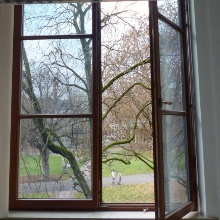The best way to prevent airborne virus transmission indoors is through a combination of the hygiene and social distancing rules already in place. This is the view expressed by the experts from engineering, natural sciences and medicine who make up the “expert team on aerosols” in the state government’s coronavirus steering group in their latest joint statement on the airborne infection path of SARS-CoV-2. The University of Stuttgart is represented in this team of experts by Prof. Konstantinos Stergiaropoulos, Head of the Institute for Building Energetics, Thermotechnology and Energy Storage (IGTE) and Prof. Gunnar Grün from the Institute for Acoustics and Building Physics (IABP) at the University of Stuttgart and Deputy Director of the Fraunhofer Institute for Building Physics (IBP).
The expert team also emphasized the importance of
- wearing masks in the correct way,
- using masks which are effective, and
- proper ventilation.
They claim that masks which are ill-fitting or worn incorrectly or which don’t provide sufficient filtration such as single-layer fabric masks do not offer any protection to the wearer or to others. Surgical masks according to DIN 14683 however already meet significantly higher requirements in terms of filtration. The best possible protection is provided by FFP2, KN95 or N95 half masks.
They claim that shock ventilation and cross-ventilation are the most efficient types of window ventilation, and that just tilting a window open is not the same as ventilating. The length of time which is necessary for ventilation purposes depends on the size of the room, the number of windows and the temperature difference between indoors and outdoors. The team went on to say that stationary or mobile indoor air purifiers can play an important part in the protection concept, particularly in spaces characterized by frequent changes of staff or where proper ventilation is not possible.


